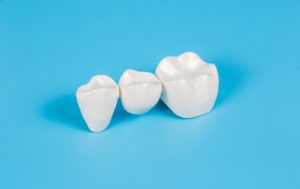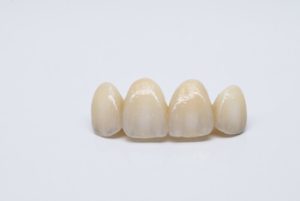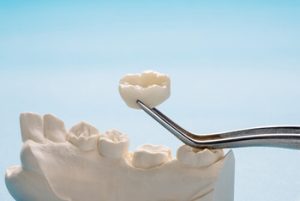Dental crowns are an outstanding solution for protecting damaged teeth. Choosing the right types of dental crowns and cost can feel overwhelming, as there are various factors to consider, such as the longevity and appearance of each crown type, making it essential to choose the one that best suits your needs.
In this article, we’ll explore the different types of dental crowns available and their associated costs to help you determine the right option for your dental restoration.
What Are Dental Crowns?
A dental crown is a personalised cap that surrounds a damaged or weakened tooth, restoring its shape, size, and strength.
Crowns protect a tooth after dental procedures like root canal treatment, fill in cracks or chips, replace missing teeth and enhance the look of discoloured or misshapen teeth.
The material of the crown influences its strength, aesthetics, and cost. Several factors come into play when choosing the best dental crown for you.
Types Of Dental Crowns
Dental crowns are made from multiple materials, each with its strengths and considerations.
Understanding their differences can help you choose the most suitable option for your dental needs, lifestyle, and aesthetic preferences.
Below are the four most common types of dental crowns.
1. Porcelain Crowns
Porcelain crowns are highly valued for their natural-looking appearance, making them a remarkable choice for replacing a decayed tooth or improving the look of those visible when you smile.
The material can be precisely crafted to emulate the colour and shape of your teeth.
 Advantages
Advantages
Porcelain crowns are popular for their cosmetic benefits.
- Natural Appearance: Porcelain mimics the clarity of natural teeth, offering a seamless blend that enhances your smile’s aesthetics.
- Biocompatibility: Porcelain is well-accepted by the body, posing a minimal risk for allergic reactions or irritation.
- Aesthetic Appeal: If appearance is a priority, porcelain crowns provide the most realistic look, especially for front teeth.
Considerations
While porcelain crowns offer stunning results, a few factors are worth weighing before deciding.
- Durability: While porcelain is strong, it can be more prone to chipping or cracking than zirconia, especially in areas with high chewing pressure, like the back teeth.
- Cost: Porcelain crowns are more expensive than lower-grade metal crowns but offer superior aesthetics and a natural appearance.
2. E-Max Crowns
E-Max crowns are made out of lithium disilicate, a high-strength ceramic material. E-Max ceramic crowns are gaining popularity because they balance strength with aesthetic appeal, making them suitable for both front and back teeth.
Advantages
E-Max crowns are versatile, offering a natural-looking result.
- Strength And Aesthetic Balance: E-Max crowns provide a strong, durable solution while maintaining a lifelike appearance, making them versatile for use in both visible and high-pressure areas.
- Longevity: E-Max crowns are highly resistant to fractures and wear, ensuring a long-lasting restoration.
- Stain Resistance: E-Max material is resistant to staining, so your crown will retain its natural look for years.
Considerations
As with any advanced dental material, there is something to keep in mind.
- Cost: Due to the advanced technology used in their creation, E-Max crowns may be slightly more expensive than porcelain crowns. However, their durability and incredible aesthetic appeal justify the investment.
3. Zirconia Crowns
Zirconia crowns are made from a strong metal-oxide ceramic known as zirconium. They’re renowned for their exceptional durability, making them ideal for back teeth or areas that experience significant pressure during chewing.
Advantages
Zirconia crowns are ideal for high-stress areas in the mouth.
- Extreme Durability: Zirconia crowns are incredibly tough, making them resistant to cracking and ideal for patients with heavy chewing forces or who grind their teeth.
- Aesthetic Appeal: While zirconia was once considered opaque, modern advances have improved its translucency, allowing for more natural-looking crowns, even for visible teeth.
- Long-Lasting: With proper care, zirconia crowns can last 10 to 20 years, making them a reliable choice for long-term dental restoration.
Considerations
Although zirconia crowns are highly durable, some patients may prefer other materials for visible teeth.
- Appearance: Although zirconia is strong, its opaque nature can make it less aesthetically pleasing than porcelain or E-Max crowns. However, advancements in material technology have made it more suitable for use in visible areas.
- Cost: Zirconia crowns are priced similarly to porcelain and E-Max options. However, their durability might make them a more cost-effective choice in the long run, as they’re less likely to require replacement.
4. Temporary Crowns
Temporary crowns are a short-term solution while waiting for a permanent dental crown to be crafted in the dental laboratory. They’re placed immediately after tooth preparation.
Advantages
Temporary crowns offer essential protection and support during the crown treatment process.
- Protection: A temporary crown protects the prepared tooth, helping reduce sensitivity and preventing damage or contamination before the final crown is fitted.
- Functionality: Temporary crowns enable you to eat and talk normally while waiting for the permanent restoration.
- Aesthetic Cover: While not as natural-looking as permanent options, temporary crowns still help maintain your appearance until the final crown is ready.
Considerations
As a short-term solution, temporary crowns come with a few limitations.
- Durability: Temporary crowns are not designed for long-term wear and can be more prone to wear or breakage, especially if exposed to excessive pressure.
- Material: Because these are softer resin crowns, their fit may be less precise than that of a custom-made permanent crown.
Factors Affecting The Cost Of Dental Crowns
The overall cost of your dental crown will depend on several things.
Here are some key aspects that influence the cost of your dental crown treatment:
1. Material Of The Crown
As discussed, the material used plays a significant role in determining your tooth crown cost. Porcelain and E-Max crowns are on the higher end of the price spectrum because of their aesthetic properties and durability. In contrast, zirconia crowns offer a more affordable yet highly durable option.
2. Location Of The Tooth
Crowns placed on back teeth tend to be more expensive due to the additional pressure placed on these teeth. If you need a crown for a molar or premolar, it’s important to choose a strong material like zirconia to ensure the crown can withstand the forces of chewing.
3. Complexity Of The Procedure
The overall complexity of the dental crown procedure can also influence the cost. For example, if you need additional treatments for your dental issues, such as root canal therapy or tooth extraction, before the crown can be placed, the overall cost of the treatment will increase.
4. Dental Lab Fees
The cost of the dental crown can also vary depending on the dental laboratory used to create the crown. High-quality dental labs may charge higher fees, but the result is a better-fitting and more durable crown.
5. Your Location
Dental crown costs can vary based on the region in which you live. Larger cities or areas with a higher cost of living usually have higher fees for dental care. It’s important to check with your dentist for an accurate cost estimate according to your location and needs.
Why Choosing The Right Crown Material Matters

Choosing a material that offers the best combination of strength, durability, and aesthetics for your specific dental needs can save you money and time in the future. While porcelain and E-Max crowns offer excellent aesthetics, zirconia crowns may be the most durable option for back teeth.
Ultimately, it’s important to discuss your options with an experienced dentist who can guide you towards the best choice based on your unique dental health, lifestyle, and budget.
How To Take Care Of Dental Crowns
Proper care of dental crowns can help extend their life, maintain oral health, and keep your smile looking its best.
While crowns are designed to be durable, just like natural teeth, they benefit greatly from regular maintenance and healthy habits.
1. Maintain Good Oral Hygiene
A strong daily oral hygiene routine is essential, even with crowns.
- Brush Twice Daily: Opt for a soft-bristled toothbrush and non-abrasive fluoride toothpaste for your teeth and crown surfaces.
- Floss Daily: Flossing around the crown helps eliminate plaque and food particles that might lead to gum issues or decay in the underlying tooth.
- Consider An Interdental Brush Or Water Flosser: These tools can be especially helpful in cleaning hard-to-reach areas, especially if you have multiple crowns or dental implants.
2. Avoid Habits That Can Damage Your Crown
Dental crowns are strong, but certain habits can still cause wear or damage over time.
- Don’t Use Your Teeth As Tools: Do not use your crowned teeth to open packaging, bite nails, or crack nuts.
- Be Mindful Of Hard Or Sticky Foods: Do not bite down on hard items like ice or lollies, and avoid chewing excessively sticky foods like caramel or chewing gum on crowned teeth.
- Consider A Night Guard: If you’re grinding or clenching your teeth at night (a common condition known as bruxism), wearing a custom-made night guard can save your crown and natural teeth from damage.
3. Visit Your Dentist Regularly
Professional care is key to the longevity of your dental crown.
- Routine Check-Ups: Schedule regular visits to your dental clinic for professional cleanings and examinations. Your dentist will check your crowns and ensure the surrounding gums and underlying teeth are healthy.
- Follow Recommendations: Your dentist may suggest specific products or techniques tailored to your crown type or personal oral health needs. Following this guidance can make a meaningful difference over time.
4. Watch For Changes Or Discomfort
It’s important to be aware of any unusual changes in your mouth.
- Contact Your Dentist If Needed: If your crown feels loose or uncomfortable, or you notice any sensitivity, contact your dental clinic. Addressing small issues early can prevent more complex treatments.
- Pay Attention To Gums: Redness, swelling, or bleeding around a crowned tooth may indicate gum irritation or infection. Good oral hygiene and timely professional care can help maintain gum health around the crown.
5. Embrace A Balanced Lifestyle
Your general well-being also contributes to the long-term success of your dental treatments.
- Eat A Nutrient-Rich Diet: A diet rich in vitamins, minerals, and water supports healthy gums and teeth and helps maintain the crown’s foundation.
- Avoid Smoking: Smoking can affect the health of your gums and the longevity of your dental crown. Reducing or eliminating tobacco use supports better outcomes and a healthier smile.
Frequently Asked Questions (FAQs)
1. How long do dental crowns last?
The lifespan of a dental crown depends on the material used and how well you care for it. Porcelain and E-Max crowns can last between 10 and 15 years, while zirconia crowns can last up to 20 years.
2. Can I choose any crown material for any tooth?
The type of crown material chosen depends on the tooth’s location. Front teeth typically require more aesthetic crowns like porcelain or E-Max, while back teeth benefit from stronger materials like zirconia.
3. Do dental insurance plans cover dental crowns?
Many private dental insurance plans offer coverage for crowns, but the extent of coverage varies. It’s important to check with your insurance provider to understand the specifics of your plan.
4. Are ceramic or porcelain crowns safe for people with metal allergies?
Yes! Ceramic or porcelain crowns are metal-free, making them an excellent option for patients with metal sensitivities or allergies. They’re also biocompatible, meaning they’re well-tolerated by the body.
5. What’s the difference between a crown and a filling?
A filling repairs a small area affected by tooth decay, while a crown covers the entire tooth when a more substantial restoration is needed. Crowns are typically recommended for extensive damage or after root canal treatment.
Conclusion

Whether you’re restoring a front tooth with porcelain for a natural appearance or opting for zirconia for durability in the back teeth, the right choice will depend on your specific needs, lifestyle, and budget. Speak with an experienced dentist today to determine the best crown option for your smile!
If you’re considering ceramic or porcelain crowns and want expert guidance tailored to your unique smile, we’re here in Greensborough to help.
Contact D’vine Smiles at 03 4828 7427 to book a consultation and discover which dental crown option best suits your needs. Let’s take the first step towards restoring your healthy smile together.
Note: Any surgical or invasive procedure carries risks. Before proceeding, you should seek a second opinion from an appropriately qualified health practitioner.
Sources
Bennett T, Martin J. Tooth Crown Health Insurance [Internet]. Finder. 2024 [cited 2025 Apr 23]. Available from: https://www.finder.com.au/health-insurance/dental/health-insurance-tooth-crown
Lopez I. What to Know About a Temporary Dental Crown [Internet]. WebMD. 2024 [cited 2025 Apr 23]. Available from: https://www.webmd.com/oral-health/what-to-know-about-temporary-dental-crown
Larson J. What You Need to Know About Dental Crowns Made from Zirconia [Internet]. Healthline. 2020 [cited 2025 Apr 23]. Available from: https://www.healthline.com/health/what-you-need-to-know-about-dental-crowns-made-from-zirconia
Modglin L. Dental Crowns: Everything You Need To Know [Internet]. Forbes Health. 2023 [cited 2025 Apr 23]. Available from: https://www.forbes.com/health/dental/what-are-dental-crowns/
Watson S. Dental Crown: Types, Cost, and Procedure [Internet]. Verywell Health. 2024 [cited 2025 Apr 23]. Available from: https://www.verywellhealth.com/getting-a-dental-crown-1059036

 Advantages
Advantages